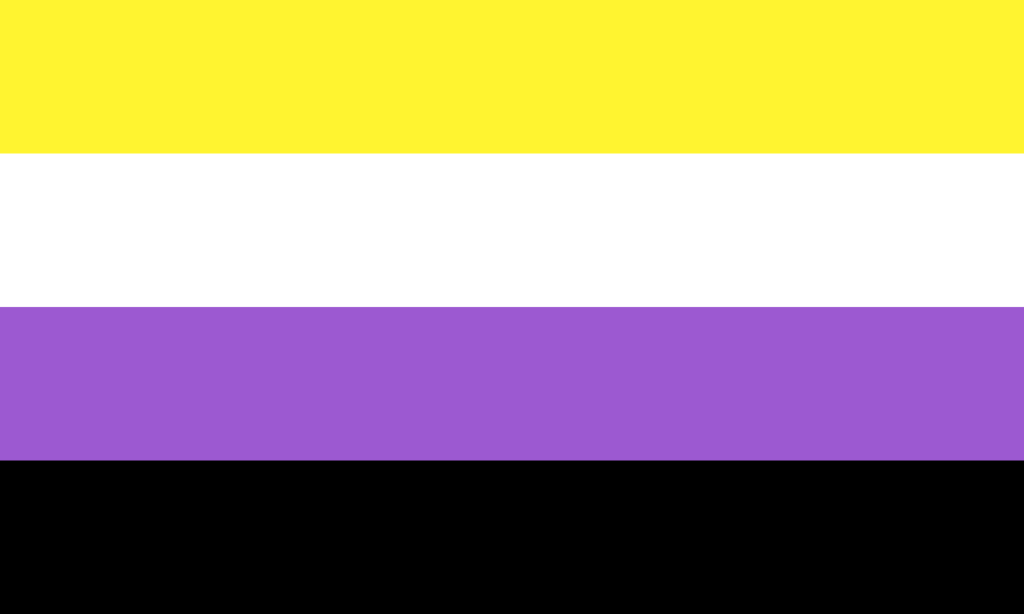As it’s Pride Month, I thought I’d write about an aspect of myself that I’ve never really talked about before – my gender!
TL:DR; I’m non-binary! But it took me a while to come to this realisation – read on for more.
I’ve never really identified with masculinity. Even as a child, I avoided traditionally ‘boyish’ activities like supporting a football club or getting muddy. I’ve never been in a fight, and do all I can to avoid them. I never really questioned my own gender in the past, but I’ve also not conformed to it.
As a teenager I found it difficult to make friends. I had little in common with most boys my age. In my late teens and early twenties I found it much easier to relate to and speak to girls/women. Overall, gender has always been a nebulous concept to me.
My attitude towards gender has also affected my romantic life. Despite being attracted exclusively to female-presenting people, I never quite understood the rituals of a traditional male-female relationship. I’ve never been one for ‘making the first move’ or grand romantic gestures; I’m sure that’s prevented me from making otherwise-viable relationships a reality. With one exception, I’ve developed all of my romantic relationships slowly from platonic friendships. I personally think that’s a good thing, but I also recognise it’s not typical. Perhaps it was a product of my general shyness and my overuse of MSN Messenger. I suspect that, in the age of social media and an abundance of chat apps, this approach is more common than it used to be.
Basically I’m non-binary
That’s enough about my early childhood – check out my Pros and Cons of Introversion post for more on that topic. I’m writing this particular post to say that I have recently realised that I am non-binary.
Side note: if you’re not already well-versed, I encourage you to read the Gender wiki’s non-binary article. For bonus points, browse through related articles such as Demigender, Demiboy and Demimasc. You will at some point roll your eyes at the sheer level of detail and idiosyncrasy in some of these articles. Don’t worry, that’s natural; a seemingly infinite number of internet users have written infinite words about their own genders. Even the most fervent Tumblr native couldn’t get through this big list of gender identities without a few giggles.

This realisation changes very little in terms of my day-to-day life. I’ve never cared all that much about gender norms, gender roles etc. Rather, this post is me expressing openly how I’ve always felt inside.
The pronouns I’ve decided upon are he/they. In other words, he/him is fine, but so is they/them. I acknowledge and accept my male appearance, but I don’t consider it a core part of my identity.
My wife Anna is also non-binary. Like me, she/they feels that gender roles and norms are, at best, guidelines that can be freely ignored. Neither of us consider ourselves to be trans, but we also don’t really associate with our birth genders. We’ve only recently started labelling ourselves as non-binary, but we’ve always felt out of place in a binary-gendered world.
Neurodiversity and gender
In 2017 I asked my GP to refer me for an autism diagnosis. The outcome of this process was that I do not have autism. Apparently my social skills are ‘too good’! I do have concerns with the diagnostic process that came to this conclusion, though. I felt that the interview process was effective and gave me the opportunity to describe my symptoms. The diagnostic tests, though, seemed designed for children, and could therefore be ‘cheated’ by someone with enough life experience. Still, I accept that diagnostic criteria isn’t something I can dispute as a lay person.
However, I wonder what impact my perceived male-ness had on the diagnostic process. If I was a woman, would the assessors have considered whether my ‘too good’ social skills were actually masking?
The way the autistic brain works is the same in both men and women. The difference comes in with the vast disconnect between the lived experiences of men and women. All autistic people are born autistic, but from birth girls are thrust into a more socially rigorous environment that increases the pressure to mask and the challenges an autistic person faces.
Kate Kahle, Behind the Mask: Autism for Women and Girls | TEDxAustinCollege
Although I was raised as a boy, my early life experiences almost certainly impacted my social skills. As a family, we lived in three different countries before I was 7. My younger sister was also born with a heart condition, which disrupted both of our childhoods in different ways. I think that both of these factors limited my opportunities for socialising with children my age. As such, I unwittingly selected hard mode when learning how to interact with others.
Diagnosis gender gaps
Given the autism diagnosis gap between men and women, it’s also possible my gender would have made no difference.
I’ve since wondered if I actually have ADHD, which shares some symptoms with autism. This could also explain some of my forgetfulness and aversion to forward planning. But both conditions have a diagnostic gender gap.
Regardless of specific diagnoses, I’ve always felt that I don’t quite see the world in the same way as others. Gender, and the norms that come with it, are a big part of that.
On a related note, research and clinical experience indicate that there is a strong link between neurodiversity and gender diversity. This makes logical sense to me – if you see the world in a different way, why should your own gender be an exception to this?
Gender vs gender roles

I’ve always tried to be mindful of gender roles and their potential to reinforce harmful stereotypes. Before my wife’s ME/CFS became more severe, we tried to share household tasks equally, while also taking advantage of our existing skills and preferences. While Anna did most of the actual cooking, I helped with food prep and always cleared up afterwards. I did the ironing and hoovering, while she typically cleaned the kitchen and bathrooms.
Things are a little different these days. As part of my role as a carer I do almost all of the housework. I also work full time. Take that, traditional gender roles!
Even as a non-binary person and a feminist, it can be hard to avoid falling foul of gender roles. A fair distribution of household chores is not the full story. It’s often the case that the ‘mental load‘ – determining what needs doing, and when – still falls upon women.
Redistributing mental load is very difficult, though. Although my household responsibilities have greatly increased, Anna often feels that they’re the one pushing the big – and little – things forward. Being born male is not the only factor in play; my neurodiversity means that I often struggle to identify tasks and complete them promptly and satisfactorily! I have to try hard to keep her informed about jobs I have done, or still need to do. Being ‘out of the loop’ doesn’t lessen mental load – if anything, it increases it. We’re still working on a good balance for this, but we’ve made big improvements in recent years.
So what’s the point?
Unlike most of my other blog posts, I don’t really have any specific knowledge to share. Still, I hope you found this post informative. I’m glad to have the opportunity to share an important aspect of my lived experience.
I would encourage everyone to think about their gender and what it means to them. Even if your gender identity is secure, I think it’s important to consider its impact on your behaviours and interests. If you conclude that being a man or woman is a core part of who you are, that’s still a useful thing to find out!
Anyway, thanks for reading. Happy Pride Month to you all.

Leave a Reply